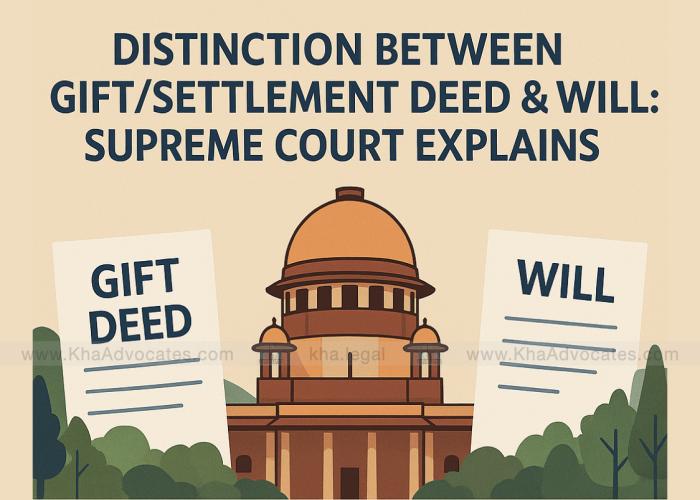
Published on: May 24, 2025
The legal distinction between a Gift/Settlement Deed and a Will plays a vital role in property transfer and succession planning under Indian law. The Supreme Court of India, in a series of landmark judgments, has clarified the core legal principles that separate these two instruments. Understanding the difference is crucial to avoid future disputes, especially concerning immovable property.
A Gift Deed, governed by Section 122 of the Transfer of Property Act, 1882, is a voluntary transfer of property by one person (donor) to another (donee) without consideration, accepted by the donee during the lifetime of the donor. A Settlement Deed is a broader document often used to distribute property among family members for future stability.
Key Features:
Immediate and irrevocable transfer
Requires registration under Section 17 of the Registration Act, 1908
Stamp duty applicable as per state law
Effective during the lifetime of the settlor/donor
A Will, as per Section 2(h) of the Indian Succession Act, 1925, is a legal declaration of the testator’s intention with respect to their property, which comes into effect only after their death.
Key Features:
Revocable until the testator’s death
No stamp duty required
Registration is optional but advisable
Takes effect posthumously
The Court held that the intention of the parties is paramount. Even if a document is titled a “Settlement,” if it confers rights only after the death of the settlor, it operates as a Will.
The Supreme Court clarified that nomenclature is not conclusive. A document labeled as a settlement deed may actually be a Will if the transfer is postponed until the death of the person executing the deed.
It was emphasized that the timing of when the rights vest in the beneficiary is critical. If vesting is immediate, it’s a gift/settlement. If it’s deferred till death, it’s a will.
Aspect | Gift/Settlement Deed | Will | |||||||||||||||||
|---|---|---|---|---|---|---|---|---|---|---|---|---|---|---|---|---|---|---|---|
Takes Effect | Immediately | After Death | |||||||||||||||||
Revocability | Irrevocable | Revocable | |||||||||||||||||
Stamp Duty | Mandatory | Not Required | |||||||||||||||||
Registration | Mandatory | Optional | |||||||||||||||||
Consideration | Not Required | Not Applicable | |||||||||||||||||
Vesting of Rights | During Settlor’s Lifetime | Upon Testator’s Death |
Succession Disputes: Incorrect drafting may lead to family feuds and litigation.
Tax Implications: Stamp duty and tax liability differ drastically.
Validity Issues: Unregistered gift deeds may be invalid; unregistered wills may face challenge during probate.
Use Precise Language: Clearly express intention to avoid misinterpretation.
Consult a Property Lawyer: Especially important for NRI clients dealing with Indian assets.
Register All Deeds: Avoid ambiguity by registering gifts/settlements.
Update Will Regularly: Changes in family or assets must be reflected promptly.
The Supreme Court’s consistent stance makes one thing clear: intention and timing of vesting are the defining parameters. While both documents can be used to transfer property, choosing the correct one based on your situation is vital. Legal consultation ensures your assets are protected and your legacy preserved.

